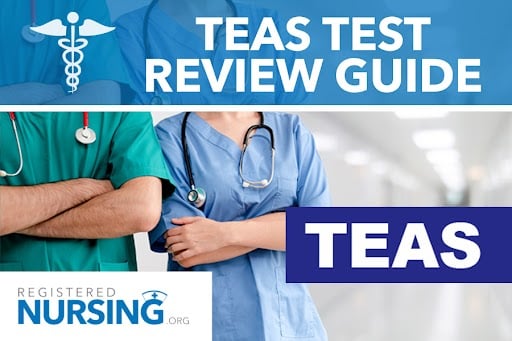PLEASE NOTE: This guide’s foundation is structured on the ATI TEAS® version of the test.
Introduction: What is TEAS and What Does it Measure?
ATI (Assessment Technologies Inc.) is the company that, among other things, constructs and authors the Test of Essential Academic Skills (TEAS). The TEAS measures and assesses a person's ability to be academically prepared to enter and succeed in nursing school. The data from this test is highly useful and helpful to those considering entering a nursing school and it is also helpful to nursing programs that use TEAS scores as part of their admission criteria. People who are interested in embarking on a career in nursing want to be able to successfully graduate from a nursing school without failure and schools of nursing want to provide quality education to those who are able to succeed in and graduate from their school of nursing. This standardized test also gives test-takers valid and reliable data that reflects their strengths, their weaknesses, their areas that need improvement and remediation, and their readiness, or lack of readiness, to begin nursing school.
"Nursing student attrition continues to pose a problem and, when paired with an already understaffed nursing workforce, interventions are urgently needed. Inconsistent measurement of attrition data has historically impeded studying the causes of nursing school attrition. ATI partners with the majority of nursing programs in the United Sates and, as a result, a product usage based, and broadly applicable, proxy for understanding nursing student attrition is described in this paper. After comparing product usage at the beginning and conclusion of each graduating class, attrition rates were calculated for 3,084 unique RN classes (2009-2011). Of these classes, 528 classes' students were found to have been screened using the TEAS V during pre-admissions testing. Analysis of class level TEAS V data shows that programs with higher TEAS V performance have significantly lower nursing student attrition."
Source: ATI Nursing Education. Research Brief: Predicting RN Student Attrition using the TEAS V
TEAS is a predictor test that statistically predicts whether or not a person can pass and graduate from a school of nursing. This type of comprehensive test statistically measures the test taker’s knowledge in four academic areas or subjects which are:
*** While we provide this extensive study guide free of charge other professional guides and adaptations are available via Amazon.com. (ad) ***
Details About TEAS
TEAS is a timed test that has only multiple-choice questions with four possible choices.
The test has a total of 170 multiple-choice questions and the total time that you have in order to take and complete the test is exactly 209 minutes or 3 hours and 29 minutes. Only 150, of the total 170, multiple-choice questions are scored and graded. The remaining 20 questions are NOT scored, graded, or part of your score on the test. These 20 questions are used by ATI to determine whether or not these questions are good and whether these questions can or cannot be used in future tests. These questions do NOT affect your final grade on the test
Each of the four areas has different maximum time allotments and each has a different number of questions.
These maximum time allotments and the number of questions are shown below for each of the four major testing sections:
Reading
- Maximum Time Allotment: 64 minutes
- Number of Scored Questions: 47
- Number of Non-Scored Questions: 6
- Total Number of Questions: 53
Mathematics
- Maximum Time Allotment: 54 minutes
- Number of Scored Questions: 32
- Number of Non-Scored Questions: 4
- Total Number of Questions: 36
Science
- Maximum Time Allotment: 63 minutes
- Number of Scored Questions: 47
- Number of Non-Scored Questions: 6
- Total Number of Questions: 53
English and Language Usage
- Maximum Time Allotment: 28 minutes
- Number of Scored Questions: 24
- Number of Non-Scored Questions: 4
- Total Number of Questions: 28
How Long Does the TEAS Test Take?
Although the test time is exactly 209 minutes, all test takers will be given a 10-minute break after the Mathematics section of the test, which is the second of the four sections in the examination. These 10 minutes are NOT considered part of the 209 minutes allocated for the test.
If there is a need for you to take a break, use the restroom, or for any other reason, you must raise your hand to get permission to do so. The time you spend taking this optional break will be counted against your test time. It is, therefore, highly recommended that you not take any breaks other than the 10-minute break all are given after the Mathematics section.
What Is the Difference Between TEAS V and ATI TEAS?
Unlike the TEAS V, you will be provided with a four-function calculator and scrap paper to use during the tests. All scrap paper, used and unused, and the calculator must be returned to the test monitor, or proctor after the test is over.
The difficulty of the exams is on par with each other however adjustments were made in the ATI TEAS to align current academic standards and understandings.
What Should I Bring to the Test?
- Valid photo ID (Gov’t issued or State ID such as a driver’s license
- Student ID card if taking it at your local school
- Copy ATI email confirmation
- Everything else will be given to you during the exam by the provider
How Much Does the TEAS Cost?
Currently, the exam runs $81 according to the ATI website.
See our TEAS test study tips.
TEAS Reading
The TEAS Reading test section measures and tests your ability to comprehend some reading passages that contain multiple paragraphs and also to interpret labels, maps, graphs, charts, directions, and measurement tools.
The three subsections for the TEAS reading section and the number of scored questions for this section are:
- Key Ideas and Details: 22 scored questions
- Craft and Structure: 14 scored questions
- The Integration of Knowledge and Ideas: 11 scored questions
TEAS Reading Details
- Total Scored Questions: 47 questions
- Number of Unscored Questions: 6 questions
- Maximum Time Allocation: 64 minutes
The three subsections for the TEAS reading section are further divided, similar to the other three major testing areas of TEAS. For the purpose of this TEAS review, we will refer to these and the other subsections of the TEAS with coding as below.
PLEASE NOTE: A tutorial content area labeled R II: 3 relates to the meaning of words and phrases in context and a test question labeled R III; 1 relates to primary sources in various media.
Key Ideas and Details: R I
In this section, you are expected to be able to:
- Summarize a Complex Text
- Infer the Logical Conclusion from a Reading Selection
- Follow a Given Set of Directions
- Identify Specific Information from a Printed Communication
- Identify Information from a Graphic Representation of Information
- Recognize Events in a Sequence
Craft and Structure: R II
In this section, you are expected to be able to:
- Distinguishing Between Fact and Opinion, Biases, and Stereotypes
- Recognizing the Structure of Texts in Various Formats
- Interpreting the Meaning of Words and Phrases Using Context
- Determining the Denotative Meaning of Words
- Evaluating the Author's Purpose in a Given Text
- Evaluating the Author's Point of View in a Given Text
- Using Text Features
The Integration of Knowledge and Ideas: R III
In this section, you are expected to be able to:
- Identifying Primary Sources in Various Media
- Using Evidence from a Text to Make Predictions and Inferences and to Draw Conclusions About a Piece of Writing
- Comparing and Contrasting Themes From Print and Other Sources
- Evaluating an Argument and Its Specific Claims
TEAS Mathematics
The TEAS mathematics test section measures and tests your ability to use algebra, measure, interpret data, and perform various mathematical operations using numbers.
The two subsections for the TEAS mathematics section and the number of scored questions for this section are:
- Numbers and Algebra: 23 scored questions
- Measurement and Data: 9 scored questions
TEAS Mathematics Details
- Total Scored Questions: 32 questions
- Number of Unscored Questions: 4 questions
- Maximum Time Allocation: 54 minutes
The two subsections for the TEAS mathematics section are further divided, similar to the other three major testing areas of TEAS. Again, for the purpose of this TEAS review, we will refer to these and the other subsections of the TEAS with coding as below.
PLEASE NOTE: A tutorial content area labeled M II: 3 relates to the comparison and ordering of rational numbers and a test question labeled M II: 4 relates to primary sources in various media.
Numbers and Algebra: M I
In this section, you are expected to be able to:
- Converting Among Non Negative Fractions, Decimals, and Percentages
- Arithmetic Operations with Rational Numbers
- Comparing and Ordering Rational Numbers
- Solve Equations with One Variable
- Solve One or Multi-Step Problems with Rational Numbers
- Solve Problems Involving Percentages
- Applying Estimation Strategies and Rounding Rules for Real-World Problems
- Solve Problems Involving Proportions
- Solve Problems Involving Ratios and Rates of Change
- Translating Phrases and Sentences into Expressions, Equations, and Inequalities
Measurement and Data: M II
In this section, you are expected to be able to:
- Interpreting Relevant Information From Tables, Charts, and Graphs
- Evaluating Information in Tables, Charts, and Graphs Using Statistics
- Explaining the Relationship Between Two Variables
- Calculate Geometric Qualities
- Converting Within and Between Standard and Metric Systems
TEAS Science
Candidates often find this section to be one of the most challenging. The TEAS Science subtest assesses a student’s knowledge of scientific reasoning, life science, the human body, and physical and earth science.
The TEAS science test section measures and tests your knowledge of life sciences, physical science, earth science, scientific reasoning, and the human body.
The three subsections for the TEAS science section and the number of scored questions for this section are:
- Human Anatomy and Physiology: 32 scored questions
- Life and Physical Sciences: 8 scored questions
- Scientific Reasoning: 7 scored questions
TEAS Science Details
- Total Scored Questions: 47 questions
- Number of Unscored Questions: 6 questions
- Maximum Time Allocation: 63 minutes
The three subsections of the TEAS science section are further divided, similar to the other three major testing areas of TEAS. Again, for the purpose of this TEAS review, we will refer to these and the other subsections of the TEAS with coding as below.
PLEASE NOTE: A tutorial content area labeled S I: 3 relates to the anatomy and physiology of the cardiovascular system and a test question labeled S II: 4 relates to basic atomic structure.
Human Anatomy and Physiology: S I
Physiology is the study of the functions of the body. Anatomy and physiology, although technically discrete and different bodies of knowledge, anatomy, and physiology are closely aligned with each other. For example, the anatomy of cardiac muscles enables the physiological performance of the heart to fulfill the body's physical need for blood flow and oxygenation and the anatomy of the digestive system enables the person to consume food and process foods so that the physical need for nutrition is fulfilled.
Some of the major physical needs of the body that are fulfilled with the body's physiology and its physiological functioning are the need for:
- Homeostasis and bodily equilibrium
- Oxygenation
- Elimination
- Nutrition
- Fluid balance
- Protection
- Movement and activity
- Freedom from external threats (infection)
- The five senses
- Reproduction
- Growth
In this section, you are expected to be able to describe the following:
- General Anatomy and Physiology of a Human
- Respiratory System – Blood flow
- Cardiac System – Oxygenation, blood flow
- Circulatory System – Blood flow
- Digestive or Gastrointestinal System – Nutrition, elimination
- Nervous System – Sensory perception, voluntary & involuntary movements
- Musculoskeletal System – Skeletal – Movement, activity, protection
- Musculoskeletal System – Muscular – Same as Skeletal
- Reproductive System – Reproduction, growth
- Integumentary System – Temperature regulation, bodily protection
- Endocrine System – Growth, metabolism, fluid balance
- Genitourinary System – Rids waste, fluid management, and control
- Immune System – Protection against infection
- Hematological System – Protection against infection, oxygenation w/ red blood cells
Life and Physical Sciences: S II
In this section, you are expected to be able to:
- Basic Macromolecules in a Biological System
- Chromosomes, Genes, and DNA
- Mendel’s Laws of Heredity
- Basic Atomic Structure
- Characteristic Properties of Substances
- Changing States of Matter
- Chemical Reactions
Scientific Reasoning: S III
In this section, you are expected to be able to:
- Scientific Measurements & Laboratory Measurement Tools
- Scientific Explanations Using Logic and Evidence
- Relationships Among Events, Objects, and Processes
- Analysis and Design of a Scientific Investigation
TEAS English & Language Usage
The TEAS English and Language Usage test section measures and tests your knowledge of spelling, grammar, punctuation, sentence structure, and contextual words.
The three subsections of the TEAS English and Language Usage test section are:
- Conventions of Standard English: 9 scored questions
- Knowledge of Language: 9 scored questions
- Vocabulary Acquisition: 6 scored questions
TEAS English & Language Usage Details
- Total Scored Questions: 24 questions
- Number of Unscored Questions: 4 questions
- Maximum Time Allocation: 28 minutes
PLEASE NOTE: A tutorial content area labeled L I: 3 relates to the anatomy and physiology of the cardiovascular system and a test question labeled 1 II: 4 relates to basic atomic structure.
Conventions of Standard English: E 1
In this section, you are expected to be able to:
- Using Conventions of Standard English Spelling
- Using Conventions of Standard English Punctuation
- Analyzing Various Sentence Structures
Knowledge of Language: E 2
In this section, you are expected to be able to:
- Using Grammar to Enhance Clarity in Writing
- Distinguish Between Formal and Informal Language
- Apply Basic Knowledge of the Elements of the Writing Process
- Developing a Well Organized Paragraph
Vocabulary Acquisition: E 3
In this section, you are expected to be able to:
- Using Context Clues to Determine the Meaning of Words or Phrases
- Determine the Meaning of Words by Analyzing Word Parts
Now go get accepted into nursing school!
PLEASE NOTE: ATI Testing, ATI™, TEAS®, and other trademarks are the property of their respective trademark holders. None of the trademark holders are affiliated with RegisteredNursing.org.
Latest Articles & Guides
One of the keys to success as a registered nurse is embracing lifelong learning. Our articles and guides address hot topics and current events in nursing, from education to career mobility and beyond. No matter where you are on your nursing journey, there’s an article to help you build your knowledge base.
Browse our latest articles, curated specifically for modern nurses.




